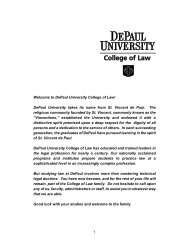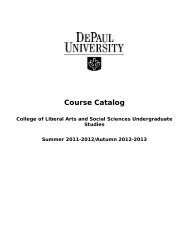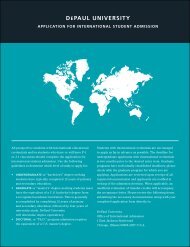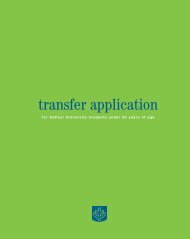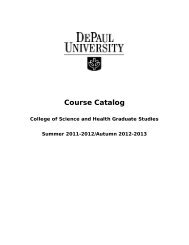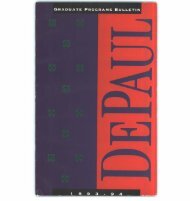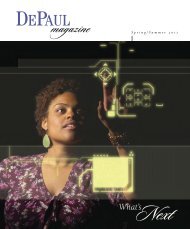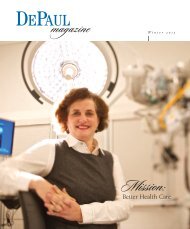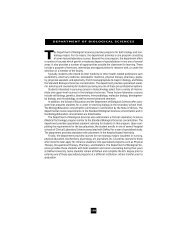Create successful ePaper yourself
Turn your PDF publications into a flip-book with our unique Google optimized e-Paper software.
Institute for Business and Professional Ethics Launches Program<br />
to Advocate Reducing Poverty through Commerce<br />
The College of Commerce recently launched an ambitious threeyear<br />
program to promote the creation of business initiatives to<br />
reduce poverty and health care inequities in Chicago as well as in<br />
developing nations.<br />
Sponsored by the college’s Institute for Business and Professional<br />
Ethics (IBPE) and supported by a $45,000 grant from Abbott<br />
Laboratories, the initiative features a lecture series, which kicked<br />
off March 5 with a talk by William Easterly. He is the author of<br />
the bestselling book, “The White Man’s Burden: Why the West’s<br />
Efforts to Aid the Rest Have Done So Much Ill and So Little Good.”<br />
Patricia Werhane, Wicklander Chair of Business Ethics and<br />
director of the Institute for Business and Professional Ethics, and<br />
William Easterly, professor of economics and Africana studies at<br />
New York <strong>University</strong>, shown with Easterly’s bestselling book.<br />
A professor of economics and Africana studies at New York<br />
<strong>University</strong>, Easterly is a nationally known expert on long-term<br />
economic growth and the effectiveness of foreign aid. He worked<br />
for 16 years as a research economist at the <strong>World</strong> Bank and is a<br />
fellow of the Center for Global Development in Washington, D.C.<br />
During the 2007-08 academic year, the IBPE will sponsor<br />
programs that examine how business could expand health care for<br />
the poor and reduce the number of uninsured. In the third year<br />
of the project, IBPE’s goal is to develop new, appealing models for<br />
the business sector to address urban poverty and health care<br />
access locally and globally.<br />
“While this focus on the for-profit sector is only one of<br />
several viable models, it is one that challenges both traditional,<br />
classical economic models and the view that only charity or<br />
government is capable of addressing poverty,” said Patricia Werhane,<br />
Wicklander Chair of Business Ethics and director of the IBPE.<br />
“As we will learn from our speakers, models for long-term change<br />
can come from for-profit programs that promote dignity, responsibility<br />
and self-reliance among recipients and the companies that<br />
create these programs.”<br />
Stuart Hart, author of the newly published book, “Capitalism<br />
at the Crossroads: The Unlimited Business Opportunities in<br />
Solving the <strong>World</strong>’s Most Difficult Problems,” is scheduled to<br />
continue the lecture series on Oct. 8.<br />
The IBPE also is actively involved in the United Nations<br />
Global Compact Networks. Created by the United Nations in 2000,<br />
Global Compact challenges business leaders and a coalition of<br />
U.N. agencies, labor unions, academic institutions and civil society<br />
organizations to advance universal principles for human rights,<br />
fair labor practices, environmentalism and anti-corruption.<br />
<strong>DePaul</strong> is taking a leadership role among the 120 academic institutions<br />
that have joined Global Compact to develop educational<br />
materials that will be used for teaching principles for responsible<br />
business worldwide.<br />
For information about the public lectures,<br />
contact the IBPE at 312.362.8786.<br />
7



